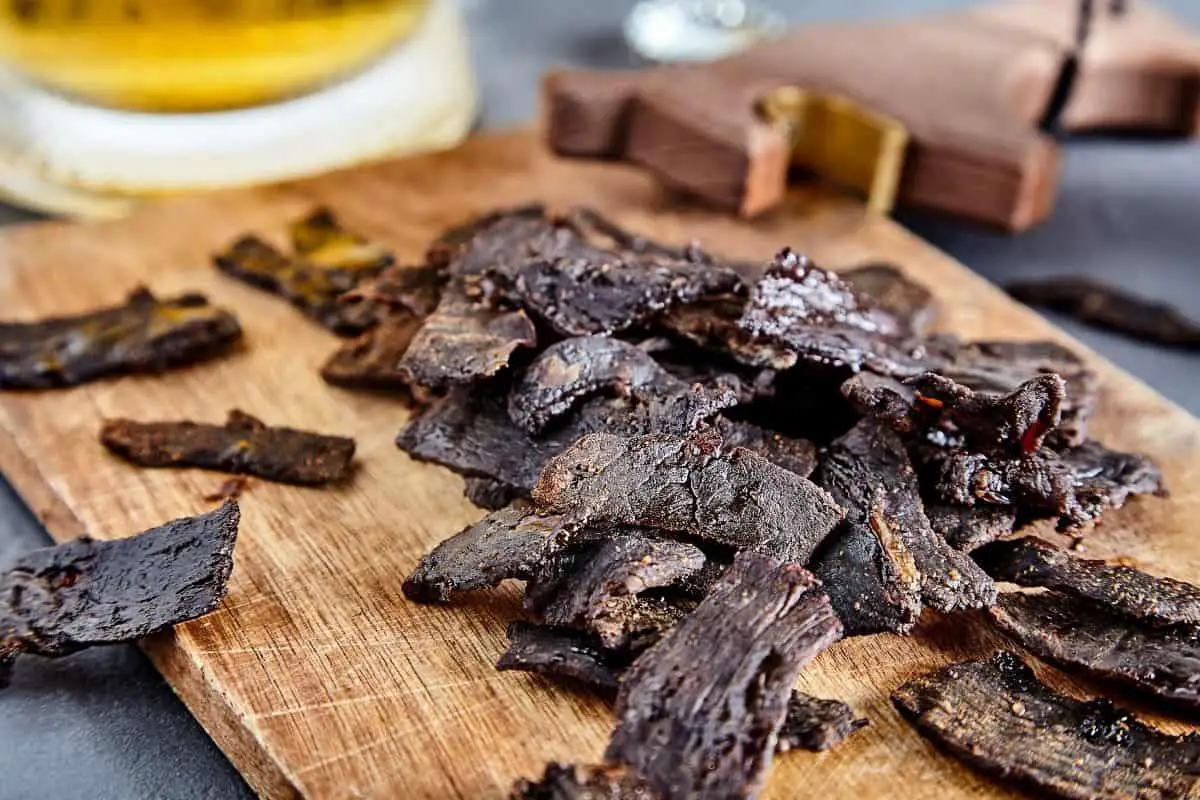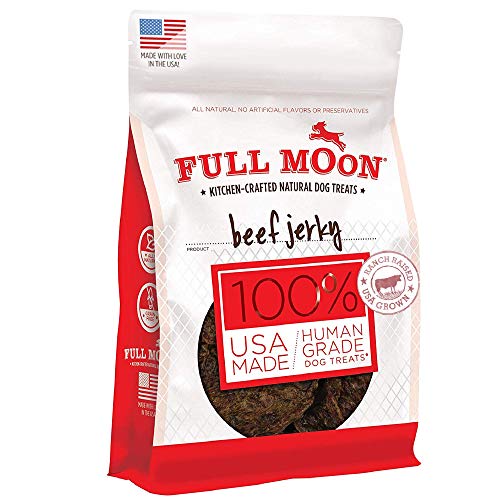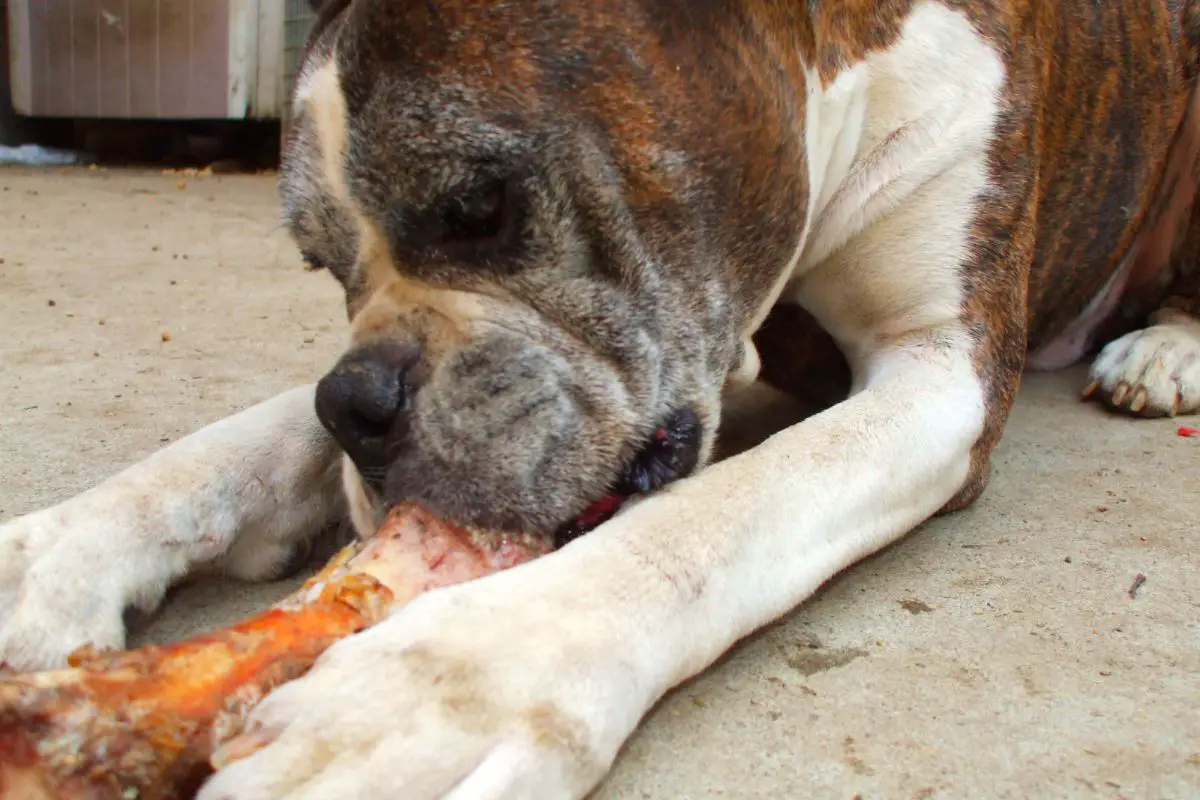This post contains affiliate links.
It isn’t unusual for dog owners to want to share their tasty foods with their furry companions, and beef jerky is one of those flavorful snacks that most dogs can’t resist. However, before giving Fido a few pieces of beef jerky, it’s important to research whether or not dogs can safely digest it.
Dogs can eat sodium-free beef jerky in moderation. Other beef jerky variations that contain added seasonings, flavorings, and spices should be avoided because they can cause adverse effects and leave your dog with an upset stomach, nausea, and diarrhea. Plain beef jerky is often the safest option.
To learn more about the benefits and potential side effects of giving your dog beef jerky, how to safely feed beef jerky in moderation, and what to look out for if you suspect your dog’s recently eaten an unhealthy amount of beef jerky, read on.
Table of Contents
Is Beef Jerky Safe for Dogs to Eat?
The term ‘jerky’ originates from the Quechua word ch’arki, translated to mean “dried, salted meat.” Beef jerky refers to lean trimmed beef strips that have been dried and salted to prevent spoilage.
Most of the store-bought beef jerky is often marinated and infused with a blend of spices and artificial sweeteners, and these recipes are typically tailored for human consumption.
The combination of high sodium, mixed spices, and artificial sweeteners, means that beef jerky isn’t the healthiest snack for your dog to be regularly eating or in large amounts, because its additives can have long-term effects on your dog’s health.
At the same time, beef jerky can be a safe, tasty, and nutritional treat when fed in smaller portions and without the extra additives, but it’s vital to limit how much of it your dog eats to prevent potential health risks.
With this in mind, let’s take a look at some of the health benefits beef jerky can offer your dog when fed in moderation, and some of the associated risks you should be aware of.
What Makes Beef Jerky a Healthy Snack?
Beef jerky made from 100% real beef is often rich in proteins, vitamin B12, and other minerals essential for your dog’s well-being. Due to its high protein content, beef jerky can also be a good treat for dogs on a weight management program.
The dehydration process preserves a lot of the beef’s nutrients beforehand and it’s even a suitable snack for dogs that follow a completely raw diet.
Beef jerky can also enhance your dog’s dental hygiene because chewing the dried meat strips removes plaque and reduces tartar build-up.
Why Can’t Dogs Eat Beef Jerky Too Often?
Beef jerky contains high amounts of salt and spices that are added to the meat during processing. Excess salt can lead to salt poisoning, with the most dominant side effects being vomiting, dehydration, and seizures.
In extreme cases, it can cause kidney problems that require immediate medical attention. Therefore, you should ensure the jerky you feed your dog is free from excessive salt or spices, such as garlic and ginger.
While most store-bought jerkies are packed with loads of these harmful ingredients, many pet stores will have specialty jerkies that are safe for your dog’s consumption.
Additionally, you can opt to prepare your homemade jerky (discussed later in the article) for your furry friend. In most cases, you can never go wrong with homemade jerky because you’ll be in control of what goes into it.
Does It Matter What Kind of Jerky You Choose?
Several complaints have been filed previously through The Food and Drug Administration (FDA) concerning the lethal effects of jerky. Although most of the complaints were linked to chicken, sweet potato, and duck jerkies, you should do your due diligence before giving any processed jerky to your dog.
The safety issue here depends on the type of beef jerky you choose. Although it’s hard to distinguish between good and bad jerky when it comes to the store-bought options, settling for the right one can go a long way in giving your dog a nutritious treat.
It’s usually best to stick to beef jerky, but choose one that has minimal or no additives. Not every pack of beef jerky you come across will be beneficial to your dog and failure to check the ingredients can result in some serious health complications later.
Feeding your dog the wrong beef jerky can lead to the following health problems:
- Beef jerky can cause an upset tummy in dogs with sensitive stomachs. This effect is because such dogs will have a hard time digesting dried meat that’s not been properly cooked.
- The snack contains a high amount of salt that’s not good for dogs. Salt contains sodium chloride that’s often toxic to canines when consumed in large quantities. The high amount of salt used to prepare beef jerky can cause salt poisoning. Notable symptoms are dehydration, frequent urination, vomiting, diarrhea, fever, seizures, and tremors.
- Beef jerky contains toxic seasoning ingredients such as garlic, onion, ginger, and black pepper. Garlic and onions are members of the allium family and are considered toxic to canines. They contain a harmful element called Thiosulfate that damages red blood cells, causing hemolytic anemia. Other symptoms of poisoning caused by these spicing elements are nausea, vomiting, upset stomach, and loss of appetite.
So, before giving your dog just any beef jerky, be wary of these potential side effects. In extreme cases, they may necessitate an emergency trip to the pet hospital.
Always Monitor Your Dog When Feeding Beef Jerky
You should start out by only feeding your dog beef jerky in small, bite-size portions. Monitor how your dog reacts afterwards to determine if continuous feeding is safe. If you aren’t confident that beef jerky is safe for your dog, refrain from feeding it again or consult with your vet for further assistance.
If your dog stumbles upon a pack of beef jerky and eats it without your consent – don’t panic – there is a high chance that he’ll be okay if the intake wasn’t high. However, keep a close watch on him and watch out for the dominant symptoms of salt and thiosulfate poisoning, such as excessive diarrhea, vomiting, dehydration, lethargy, and seizures.
To counter the excessive dehydration, give your dog plenty of clean water and watch out for any other symptoms that seem to persist.
Symptoms that do persist may require emergency vet care, so it’s important to have a clinic or hospital on-call if you need urgent help.
Here’s How To Make Your Own Beef Jerky at Home
If you’ve found that your dog can safely digest beef jerky and is eager to try some more, why not make some more at home? As noted before, homemade beef jerky is much healthier and safer for dogs because it’s fresher and you’re able to control what ingredients go into it.
When making beef jerky at home, you can skip using salt and other spices that can be toxic to your dog, and you’ll come up with a tasty and nutritious treat to keep on-hand.
Don’t worry about digging deeper into your pockets to get specialized kitchen gadgets for this task. All you need is a dehydrator or oven and some time to spare. Your dog will thank you later!
Here’s what is required to make beef jerky at home:
- Preparation time: 20 minutes
- Cook time: 4-6 hours
Key Ingredients
- Lean beef
- Nutritional powder (optional)
Directions: Cooking Using an Oven
- Preheat your oven to 160°F or 70°C.
- Trim any fat from your beef and make thin strips about ¼ inches (about 6mm) thick.
- Lay the beef strips on the oven trays or grills and leave them to cook.
- Allow them to cook for about an hour and turn them. Keep turning the strips until you are satisfied with the outcome. Look out for the changes in color and texture as the beef strips lose their moisture.
- Once content with the outcome, probably after 4-6 hours, depending on your preference, turn off the oven, remove the dehydrated strips, and leave them to cool in the open air.
- After the beef jerky has completely cooled, feed the pieces to your dog and pack the excess for storage.
How To Store Homemade Beef Jerky
If properly stored in airtight containers, beef jerky can last for several months.
So, here are some ways you can safely preserve your homemade jerky:
- After completely cooling down, place your beef jerky in airtight containers ready for storage, ensuring it’s completely dry.
- Vacuum seal your jerky to keep it for an extended period.
- Store your homemade beef jerky in a dry, cool place to prevent premature spoiling.
If, at any point, you notice any strange smell or color changes in your jerky, it might be a sign that it is spoiled, and you shouldn’t give it to your dog.
That’s it! All it takes to prepare homemade beef jerky for your dog is a little time, patience, and attention to detail, and your dog will thoroughly enjoy the tasty outcome.
FAQs
Although store-bought, flavored beef jerky can have negative side effects on your dog’s health, you don’t need to shy away from letting your dog try some homemade beef jerky. Fresh, plain beef jerky can offer nutritional benefits, especially when prepared with your dog’s health and safety in mind.
Let’s go through some of the remaining questions you may have about feeding your dog beef jerky if you still aren’t sure.
Can Beef Jerky Kill My Dog?
Beef jerky can’t kill your dog outrightly. However, if no immediate medical action is taken after your dog consumes a high amount of jerky, the effects can be extreme and even result in death.
Therefore, it’s advisable to consult a vet if your dog consumes beef jerky, especially the store-bought kind that comes with loads of salt, spices, and artificial preservatives that can be toxic to canines.
What Is Beef Jerky Made From?
If you are wondering what beef jerky contains, worry no more! This snack is made from strips of real beef that have been dried and seasoned. Most manufactured jerkies are packed with loads of spices and marinades to give them their unique flavor.
Dried meat lasts longer and often comes with a chewy texture best suited for a dog’s dental health.

Is Homemade Beef Jerky a Good Treat for Dogs?
Compared to store-bought jerkies, homemade jerky is a good option if you want to give your dog this tasty snack. Remember that most manufactured beef jerkies contain lots of salt and spices that don’t react well with dogs.
However, with homemade beef jerky, you can skip the toxic ingredients and instead focus on quality nutritious powders. Either way, you end up getting a healthy, delicious treat for your dog that you can feed him without any fear of compromising his health.
Can I Feed My Dog Teriyaki Beef Jerky?
Teriyaki beef jerky contains a significant amount of teriyaki sauce that can negatively affect your canine’s health. This is because teriyaki sauce contains soy sauce, garlic, brown sugar, honey, and other spices known for being toxic to dogs.
Therefore, it’s not safe for dogs to consume teriyaki beef jerky.
How Do I Tell if Beef Jerky Has Gone Bad?
Since beef jerky is made from dried meat, it can last for several months. However, if not properly stored, it can easily go bad, making it more unfit for consumption.
To tell if your beef jerky has gone bad, watch out for a strange smell coming from the storage container. Additionally, take note of any mold or discoloration on the surface.
If your beef jerky becomes too hard, it can also be an indication of spoilage. Always check for changes in your beef jerky before you feed a piece to your dog.
How Much Beef Jerky Should I Give My Dog?
Like with other treats, beef jerky should not be eaten as a substitute for a meal. Instead, you should only give your dog beef jerky on occasion as a reward for good behavior.
The rule of thumb when feeding dogs is, treats shouldn’t account for more than 10% of your dog’s daily calorie intake.
Why Does Beef Jerky Make My Dog So Thirsty?
Beef jerky is dehydrated meat. Due to its zero moisture content, it’s likely to make your dog slightly dehydrated, especially when consumed in large quantities. Always ensure your dog has access to plenty of fresh, clean water when munching on strips of beef jerky.
Conclusion
Dogs are carnivores, and their instincts go well with foods and snacks containing real animal protein such as beef jerky.
However, dogs should only consume this snack in moderation. Additionally, you should be wary of the salt and spice content in the jerky before giving it to your favorite companion. Excess salt and spices used to create store-bought beef jerky can negatively affect your dog’s health.
Therefore, when choosing beef jerky for your dog, opt for one that’s specially designed for dogs or prepare a homemade jerky that contains no salt and other toxic ingredients.
If you’re interested in what dogs can eat instead of dog food? Then you should take a look at this article I wrote about what you can feed your dog if you run out of dog food.
Sources
- Wikipedia: Jerky
- FDA: FDA Investigates Animal Illnesses Linked to Jerky Pet Treats
- Easy Spaniel Training: Can dogs eat beef jerky?
- Serve Dogs: Can dogs eat beef jerky? Complete Guide.
- Dog Breeds Chart: [2021] Can Dogs Eat Beef Jerky – Is Beef Jerky Good for Dogs?
Mrdogfood.com is a participant in the Amazon Services LLC Associates Program, an affiliate advertising program designed to provide a means for sites to earn advertising fees by advertising and linking to Amazon.com. We also participate in other affiliate programs which compensate us for referring traffic.





